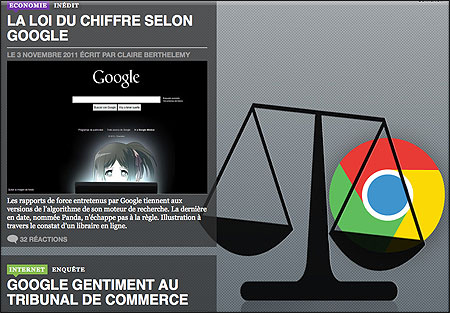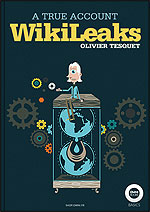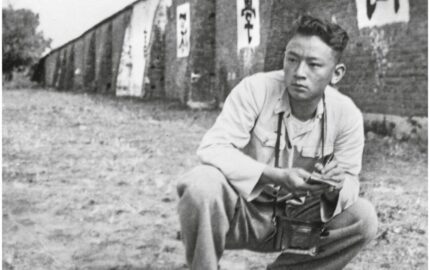
Writing the Book
How does a journalist make the journey to author? A variety of paths and potential pitfalls are here for you to learn from. Authors of memoirs, novels and nonfiction narratives write frankly about the ups and downs. These days the topic of books can’t be discussed without mentioning online platforms and self-publishing so you’ll also hear from the individuals behind The Atavist and Byliner as well as an author who brought his book back from the dead via print-on-demand. If you have a publishing (horror or success) story you’d like to share, please drop us a line at nreditor@harvard.edu.
Visit Owni.fr and adjacent to its logo, among French words and enticing graphics, is its English tagline: News, Augmented. The words reflect the website's ambitious spirit, its dictum, and manifesto: to present news with an added layer of digital bonuses—maps and apps and interactive infographics. An intriguing red circle on a tiny pull string hangs from the top of our homepage. Scroll over the circle and the OwniShop logo appears. Move it away, and the logo vanishes.
This understated, almost coy advertising strategy mirrors Owni's tentative e-book sales strategy. Though e-book sales in France are rapidly picking up, especially with the Kindle store opening this past October, Owni is the first media outlet in France to sell e-books as part of its core editorial output.
The Owni website features augmented and data-driven stories and investigations. Blogger and Web entrepreneur Nicolas Voisin founded Owni in 2009 at a time when bloggers were involved in a massive campaign against France's passage of the antipiracy HADOPI law involving copyright issues. With Owni, he created a platform for the blogging community and he hired staff to oversee the content, its presentation, and its distribution. The website's editorial focus is promoting freedom of expression.
Like other websites in France, Owni receives a government subsidy and brings in some money through fundraising. Voisin's Web agency 22Mars, founded in 2006, takes in revenue from the sale of various products related to Owni, including apps, online platforms, interactive maps, and infographics. Yet none of these items sells enough to make a profit. Will selling e-books make a difference? It's too soon to know.
Finding adequate revenue to sustain their work is proving difficult for digital outlets, especially those with a focus on news. Owni struggles with this issue; it doesn't carry advertisements and publishes all of its content under a Creative Commons license. Selling products—including e-books—is its big bet.
"This strategy has just begun," says Owni cofounder, editor and reporter Guillaume Ledit. It began as a result of two developments. At the start of 2011, Guillaume Dasquiet was hired as the site's editor in chief. A freelance investigative reporter with experience in long-form journalism, he had worked for the French publisher Flammarion, where he was in charge of putting together and publishing collections of nonfiction from 2005 to 2007. The second motivating event was the release of a book about WikiLeaks, written by Owni's former chief political reporter Olivier Tesquet, who obtained rights to publish the book in a digital format. In April 2011 "La Véritable Histoire de WikiLeaks" ("WikiLeaks: A True Account") became the first e-book to be sold in the OwniShop, priced at a bit less than four euros (or $5.50).

The e-books published by Owni, a news website based in France, focus on the site’s core issues of technology, privacy and piracy, yet experiment with other subjects.
Selling E-Books
OwniShop has released only four e-books for sale. In December 2010 Owni created 10 e-books that were collections of essays and articles originally published on the website and gave them to loyal readers. While the idea of selling e-books does seem forward-thinking, it is not revealing itself as a cash cow. "This is merely our initial foray," Ledit is quick to say. But if a measure of success is OwniShop's social media impact, then it has not been an impressive debut. Since April the online shop has gained just 95 followers on Twitter and 85 fans on Facebook. Though the company has not disclosed exact sales figures, Ledit admits that "so far we are not making any profit. In fact, we're looking more at losses."
What is now an unprofitable short-term venture might turn out to be successful in the long term. Despite the low number of e-book sales, confidence in this strategy has led Owni to adjust its editorial work and set new profit targets. The website now publishes fewer daily news stories and directs more of its resources toward production of e-books. Owni published two e-books in November—one on the French presidential elections and another on network surveillance.
Another outcome of Owni's editorial shift has been a considerable broadening in its scope of topics. Along with Owni e-books about net neutrality, WikiLeaks, French politics, and an account of the antipiracy law, Owni published an e-book—available in French and English—called "Rugby Stories." Sylvain Lapoix, Owni's chief political and environmental reporter, explained the choice of rugby as an e-book: "This was a test. We picked a topic that was trending in the news; we saw it as an opportunity to do a good 'design' job. It's a one-shot tryout," he said.
"We are banking on the fact that the market in France will be ready in a few years, and we want to be seen as the first digital editor for digital cultures," Dasquiet explained. "Our news staff consists of 12 journalists, all of whom are committed to writing an e-book covering the topic on which they have been specializing." Between November 2011 and July 2012, Owni expects to publish 12 e-books, all of them written in-house. Dasquiet said, "The whole strategy can be seen as a way to re-center our objective: we are a part of the company, 22Mars, but we have a specific expertise."
Owni's e-books are embellished by the work of French graphic artist Loguy, who has given Owni's stories a distinct look from the beginning. He infused Tesquet's book about WikiLeaks with infographics and beguiling illustrations. Owni plans to "include an element of interactivity to its e-books by fully exploiting new Web tools such as HTML5," Ledit told me. What this will mean in a time of DRM-protected, static e-book file formats remains to be seen.
For now Owni, as a website, plows a lone furrow in France's burgeoning digital publishing market. Outside of France, the likes of Ars Technica and The Huffington Post are also testing this strategy. However, without the financial resources of juggernauts such as Condé Nast and AOL, Owni risks turning its independently funded guinea pig into a victim of the digital revolution.
Federica Cocco, a freelance journalist, is the founder and former editor of Owni.eu, Owni's English language sister website.
This understated, almost coy advertising strategy mirrors Owni's tentative e-book sales strategy. Though e-book sales in France are rapidly picking up, especially with the Kindle store opening this past October, Owni is the first media outlet in France to sell e-books as part of its core editorial output.
The Owni website features augmented and data-driven stories and investigations. Blogger and Web entrepreneur Nicolas Voisin founded Owni in 2009 at a time when bloggers were involved in a massive campaign against France's passage of the antipiracy HADOPI law involving copyright issues. With Owni, he created a platform for the blogging community and he hired staff to oversee the content, its presentation, and its distribution. The website's editorial focus is promoting freedom of expression.
Like other websites in France, Owni receives a government subsidy and brings in some money through fundraising. Voisin's Web agency 22Mars, founded in 2006, takes in revenue from the sale of various products related to Owni, including apps, online platforms, interactive maps, and infographics. Yet none of these items sells enough to make a profit. Will selling e-books make a difference? It's too soon to know.
Finding adequate revenue to sustain their work is proving difficult for digital outlets, especially those with a focus on news. Owni struggles with this issue; it doesn't carry advertisements and publishes all of its content under a Creative Commons license. Selling products—including e-books—is its big bet.
"This strategy has just begun," says Owni cofounder, editor and reporter Guillaume Ledit. It began as a result of two developments. At the start of 2011, Guillaume Dasquiet was hired as the site's editor in chief. A freelance investigative reporter with experience in long-form journalism, he had worked for the French publisher Flammarion, where he was in charge of putting together and publishing collections of nonfiction from 2005 to 2007. The second motivating event was the release of a book about WikiLeaks, written by Owni's former chief political reporter Olivier Tesquet, who obtained rights to publish the book in a digital format. In April 2011 "La Véritable Histoire de WikiLeaks" ("WikiLeaks: A True Account") became the first e-book to be sold in the OwniShop, priced at a bit less than four euros (or $5.50).

The e-books published by Owni, a news website based in France, focus on the site’s core issues of technology, privacy and piracy, yet experiment with other subjects.
Selling E-Books
OwniShop has released only four e-books for sale. In December 2010 Owni created 10 e-books that were collections of essays and articles originally published on the website and gave them to loyal readers. While the idea of selling e-books does seem forward-thinking, it is not revealing itself as a cash cow. "This is merely our initial foray," Ledit is quick to say. But if a measure of success is OwniShop's social media impact, then it has not been an impressive debut. Since April the online shop has gained just 95 followers on Twitter and 85 fans on Facebook. Though the company has not disclosed exact sales figures, Ledit admits that "so far we are not making any profit. In fact, we're looking more at losses."
What is now an unprofitable short-term venture might turn out to be successful in the long term. Despite the low number of e-book sales, confidence in this strategy has led Owni to adjust its editorial work and set new profit targets. The website now publishes fewer daily news stories and directs more of its resources toward production of e-books. Owni published two e-books in November—one on the French presidential elections and another on network surveillance.
Another outcome of Owni's editorial shift has been a considerable broadening in its scope of topics. Along with Owni e-books about net neutrality, WikiLeaks, French politics, and an account of the antipiracy law, Owni published an e-book—available in French and English—called "Rugby Stories." Sylvain Lapoix, Owni's chief political and environmental reporter, explained the choice of rugby as an e-book: "This was a test. We picked a topic that was trending in the news; we saw it as an opportunity to do a good 'design' job. It's a one-shot tryout," he said.
"We are banking on the fact that the market in France will be ready in a few years, and we want to be seen as the first digital editor for digital cultures," Dasquiet explained. "Our news staff consists of 12 journalists, all of whom are committed to writing an e-book covering the topic on which they have been specializing." Between November 2011 and July 2012, Owni expects to publish 12 e-books, all of them written in-house. Dasquiet said, "The whole strategy can be seen as a way to re-center our objective: we are a part of the company, 22Mars, but we have a specific expertise."
Owni's e-books are embellished by the work of French graphic artist Loguy, who has given Owni's stories a distinct look from the beginning. He infused Tesquet's book about WikiLeaks with infographics and beguiling illustrations. Owni plans to "include an element of interactivity to its e-books by fully exploiting new Web tools such as HTML5," Ledit told me. What this will mean in a time of DRM-protected, static e-book file formats remains to be seen.
For now Owni, as a website, plows a lone furrow in France's burgeoning digital publishing market. Outside of France, the likes of Ars Technica and The Huffington Post are also testing this strategy. However, without the financial resources of juggernauts such as Condé Nast and AOL, Owni risks turning its independently funded guinea pig into a victim of the digital revolution.
Federica Cocco, a freelance journalist, is the founder and former editor of Owni.eu, Owni's English language sister website.



